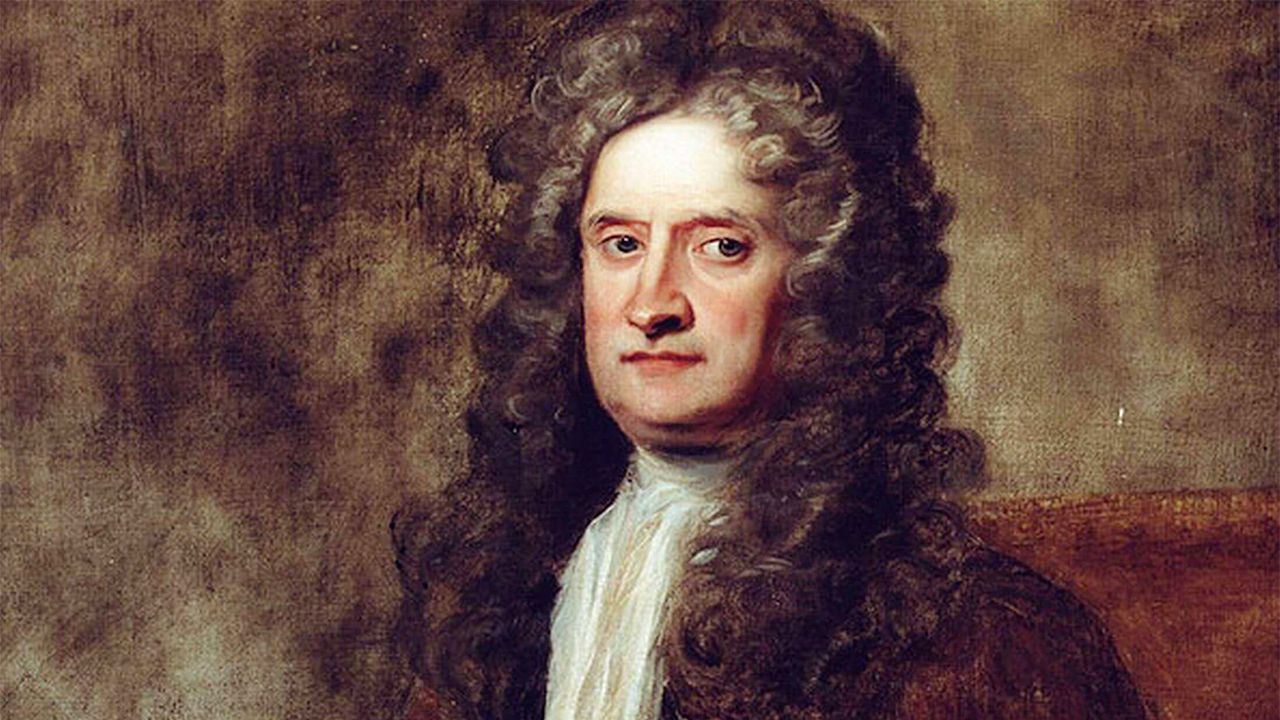The world of science can boast hundreds of important names and prominent figures who have contributed decisively to making it a precise and ever more in-depth discipline. Making a list of these names is unthinkable and each in his own way, among hundreds of scientists, philosophers and mathematicians of the past has made a fundamental contribution in making possible the technological miracles we are witnessing today.
But, as we also did a short time ago for the good Galileo Galilei, today we want to focus on another pillar of science, of immense fame and greatness: Isaac Newton. Perhaps, one might think, that everything has already been said about his discoveries and his works – and in the end it is true – but our analysis will try to highlight also those lesser known aspects, such as his strange personality and "impossible" characterIn fact, several times we have said that genius and madness go hand in hand, and we will discover how even the good Isaac is not exempt from this combination.
A genius from childhood
Little Newton had a strong inclination for math from an early age.
He was born in the county of Lincolnshire, in the United Kingdom, on Christmas day 1642, according to the Julian calendar, or our January 4, 1643 (although the Gregorian already existed, in England it was adopted only three centuries later and therefore the date of birth of the English scientist is often written in both ways). His childhood was not easy having lost his father even before he was born and then having established a bad relationship with his stepfather.
Many years of conflict passed despite Newton being still a child, even coming to violent threats. After his stepfather's death, he paid for his education, but instead of enjoying his youth, he developed an unstoppable passion for building small working mills, hourglasses and sundials.
The mother, worried by her attitude, tried to get him away from school and to make him concentrate on the work of a farmer, but fortunately for us a teacher intervened who convinced the parent to let him continue in academic life. At 19 Newton found himself in Cambridge, where he started his climb to success and fame, later becoming a Lucasian professor of mathematics in 1669.
The innumerable discoveries

Having found the right place to better enjoy his passion, the activity of inventor and discoverer of Newton – both as a mathematician and as a physicist – experienced an incredible surge bringing to light theorems and laws that for us today are a bit the ABC of science teaching. To name a few, in this period our professor defined and discovered the binomial system (to make a long story short: binomial square, trinomial square and the like), he worked in the study of new possible applications of logarithms and began to sketch the famous "infinitesimal calculation"(to which we will return shortly).
But he did not fail to try his hand in the field ofOptics, where he discovered, thanks to a prism, the spectral composition of a beam of light. With this deduction he was able to deeply modify Galileo's telescope, making it an instrument of infinitely higher precision. It was the birth of the so-called "Newtonian telescope", or rather a reflecting telescope and no longer a refractor (as was that of Galilei). It is fair to remember, however, that a similar instrument was conceived many years earlier, but Newton's modifications made it a much more advanced instrument (by the standards of the time).


Such was the success of the telescope that the Royal Society (one of the most authorial and ancient scientific organizations in the world, believed to be still today) called it to give a practical demonstration. But in the following years he certainly did not cease to surprise: he was responsible for them laws of motion and of universal gravitation, the definitions of mass and inertia, the theory of corpuscular light (which we know today to be good or bad only half true), a new productivity system of the British Royal Mint (which weighed heavily on the return of the economic stability of the Reign, the fault of the Thirty Years War which consumed a lot of funds) and even a new analysis and interpretation of the Holy Scriptures.
The first terrible clash
The interest of colleagues and scholars for his work gave him courage and managed to get him (even if for a short time) out of his condition as an extremely closed man, introverted and perhaps jealous of his discoveries, by publishing short official notes called "On the colors ". Once you publish something, however – you know – you go to criticism, which can be enthusiastic or disparaging. Many of the academics were satisfied with the work of English but one of them, a certain Robert Hooke (certainly not a child of anyone, since the latter is also considered one of the fathers of the scientific revolution), he allowed himself to criticize Isaac's work.
Before this moment the two were quite friends and often had long-distance correspondences on scientific subjects but, after Hooke's criticism on the question of the nature of light, claiming that Newton had also made mistakes on his notes regarding the law of gravitation, the friendship turned into a fierce diatribe that also involved the Royal Society for many years to come.
To really get out with broken bones was poor Robert, who had to face a Newton almost at the height of his career and with an overwhelming influence on the whole scientific community.
It would seem that Newton even took the liberty of insult him for his stature, and who – far more seriously – continued to rail against his ex-friend even after he died. Shocking is the fact that the year of Hooke's death coincided with the election as president of the Royal Society of Isaac Newton (1703) and that the latter had the paintings that depicted his deceased colleague removed and hidden, in order to erase them the memory for posterity. This succeeded him all too well, so much so that even today it is not certain what the features of Robert Hooke are.
The feud with Leibniz

During his life as an academic and as a professor, as we have already mentioned, Isaac made formidable discoveries and had several brilliant and elegant intuitions also in the world of mathematics. One of his successes was to have given birth to the notorious infinitesimal calculation. In reality, he did not invent much, given that the calculation procedures were already known many years before, but thanks to his contribution (and to that of Leibniz) it was possible to arrive at the definitive form of the calculation of derivatives and integrals that we know today.
But what's that got to do with it Leibniz in all this? He was a very famous German scientist and philosopher, and for the uninitiated to date the invention of derivatives and integrals is attributed to both, (Leibniz concentrated above all on the right symbolism to be used, while Newton on practical applications).
However, we know this, centuries later and after a very long historical research. At that time, however, things went differently it was a fight between genes with no holds barred. The Royal Society was also involved in this dispute, and a special commission was appointed to resolve the issue.
The most unusual thing, however, is that, when it was time for the "verdict", Newton was already president of the association and enjoyed the almost unanimous support of the commission. Furthermore, he seems to have written the final report himself. In short, it cannot be said that the judgment was fair.
For this "vile" treatment Leibniz bitterly accused Newton and this feud led to a slowdown in the spread of the new discoveries of the English scientist in the rest of Europe. Then, as he already did with Hooke, Newton railed on his German colleague even after his death, erasing from his main work (the so-called "Principia") all references to Leibniz 's discoveries on which he had based himself, trying to obscure all his possible contributions.
For the sake of truth, it is to be considered that most of the damage was caused by the colleagues of the two scholars: the first accusations in fact were made by friends close to them, who began to behave like "bad tongues"and to underline how similar one job was to another, until the accusations of plagiarism were reached.
The two initially found themselves at the mercy of the events – and there is evidence of their direct correspondence to try to calm the hearts – but the fuse was now on and Newton, as president of the Royal Society and as the greatest exponent of the academic world he could show a weak or too condescending pulse.
Secrets and doctrines
Around our character there was a good dose of mysticism that was created in the years after his death, when more and more details gradually emerged on his behalf. He was a terribly reserved and extremely insecure man: it was never decided whether to publish his discovery or not, even taking ten years to make his work official, and often this was done only after the push of colleagues. It was impossible to imagine what he knew and what he had discovered, and this only increased his aura of mystery. In addition to this there is also another data that must be taken into account: it was very close to the Neoheic doctrine (a sort of stoicism that tried to get closer to Christianity too) and Pythagoreanism. This led him to have a very closed ideology especially with the concept of "spreading knowledge", which was to be dispensed only to a select few (and perhaps this also kept him from publishing his new theories immediately).
He was also accosted to secret sects and obscure, like the Rosicrucians or the well-known Priory of Sion (reported in vogue especially by Dan Brown in his "Da Vinci Code"). We do not know if he had ever been part of any secret association, let alone these two just mentioned that most likely never even existed, but certainly Newton's charm came out strongly reinvigorated.
The controversial character and obsessions
We brought you back only two of the various scuffles which happened in the life of Isaac Newton, but already from these it can be understood that as the character he was anything but affable, and indeed he was often shy and impossible to "accommodate". In the centuries following his death, studying both his works and himself as an individual, many wondered what could be the cause of this temperament and various hypotheses were put forward. One of the most plausible is that – as often happens to men and women of genius – he may have suffered from some disease or more than anything from some personality disorder.
There are those who supported a bipolarity and who instead hypothesized the Asperger syndrome. His difficulty in establishing any type of lasting social relationship (just think of the fact that he never had a wife, girlfriend or boyfriend, and who is said to have died a virgin) and his obsessive behaviors can easily make one think of an Asperger syndrome (someone he said Sheldon Cooper? or Greta Thunberg?), all seasoned with a good dose of self-centeredness and a lack of empathy.
Another aspect to keep in mind, however, is that Newton was also obsessed with another branch of science at the time: Alchemy. It is said that for whole months he shut himself up in his studio between vapors and gases in order to experiment and discover alchemical combinations.


As proof of this fact there is that during the exhumation of his corpse an analysis was performed on his hair, finding very high mercury concentrations. This heavy metal, if taken in good doses – and for a long time as probably happened in Newton – can lead to poisoning and mental disorders with episodes of delirium. Indeed, several times there has been evidence that he has had psychotic episodes, complete with delusional letters sent to some friends.
Regardless of the shadow that can be cast on his account, it is undeniable that his light was infinitely more intense, so as to touch and illuminate many other disciplines not directly related to his studies. It is right then to leave us remembering it with a nice epitaph written by Alexander Pope, which however was never transcribed on his tomb in Westminster: "Nature and the laws of nature lay hidden in the night; God said," May Newton be! "And there was light".















